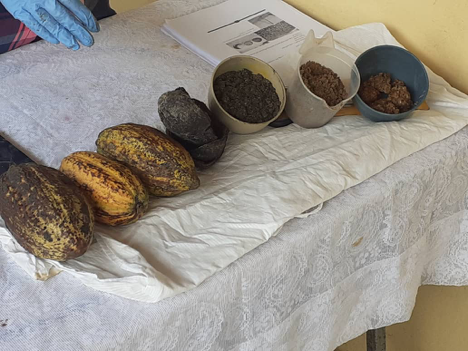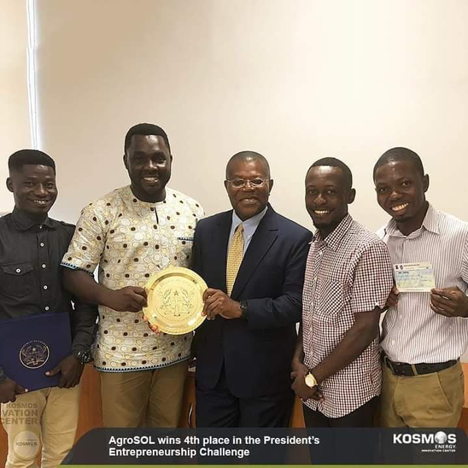One advantage entrepreneurs of our time have is innovation. The technological world we live in today has created the platform for innovation, especially, among young people. And so, young men and women of our time who venture into entrepreneurship are making things through technology and innovation. That is why sectors such as the agriculture sector, which were formerly not attractive to the youth, are now brimming with youthful vigour. The B&FT’s Inspiring Startups this week features four young men who founded a company set up to turn agricultural waste into useful products for some industries. Read on as Richmond, one of the founders, narrates how it all began.
Richmond Zissu Nutsuglo grew up at Tema in the Greater Accra Region. He is a product of the Pope John Secondary School in Koforidua, where he read general science. He had his first degree in Agriculture Science from the University of Ghana where he specialised in post-harvest technology.
Richmond, like most young Ghanaians, was not attracted to agriculture as it has long been considered an occupation for the poor. But, for some curious reason, agriculture was one of the subjects which usually scored him high marks in school. So when his quest to study engineering in university couldn’t materialise, he was advised by someone to consider studying agriculture since he had always performed well in the subject. Well, that advice became a breakthrough for him and he has never lived to regret it.
After completing university, he did his national service at the Tema Naval Base where he worked in the agriculture department. Later, after national service, he worked with some private organisations for a short period. During his last job at the British Council, his manager advised him to go into agriculture after observing his (Richmond) keen interest in the sector. He took his manager’s advice to heart and applied for a competition dubbed ‘Agritech Challenge’, organised by Cosmos Energy. That was where he met his business partners – Justice Amenorpe, Isaac Danso Asiedu and Joseph Bryden.
Agro Sourcing Ltd. is born
The quartet together founded Agro Sourcing Ltd. and put up a business plan that sought to re-use agricultural waste. They presented the idea to Cosmos Energy and they were awarded funding to carry out research on their innovative idea. After that, they also joined the Presidential Pitch competition in 2018 – and fortunately for them, they advanced to the final stage and got some funding from there. With these supports, Agro Sourcing Ltd. came to life. The ultimate goal of this startup is to add value to agricultural product-waste – such as turning cocoa pods to potash, which can be used in the cosmetic industry to prepare soap and lotions; in the pharmaceutical industry to make certain medicines; and as fertiliser.

Vision
Agro Sourcing Ltd. wants to grow to become one of the big names among companies that add value to agriculture residue, so that in the process it can employ as many people as possible.
To ensure business continuity, Richmond and his team have understudied some larger companies which have put in place strategies and policies to ensure their organisations continue to exist in the foreseeable future. As part of the strategy to ensure business continuity there is diversification, whereby they plan moving into other ventures within the agriculture sector to keep the business running.
Challenges
For Richmond, the biggest challenge faced by his company is getting adequate funds to set up a factory that will turn the massive agricultural waste in the country into useful products for the industries mentioned earlier. There is a huge potential for the business, but Richmond says it requires a huge amount to set up a factory to take advantage of the potential.

Another challenge is inadequate logistics and road poor networks. Many cocoa farms are far away from the capital city, and the roads leading to the farms are very bad; so, it hasn’t been easy for them to mobilise the needed logistics and transportation to source raw materials from the farms. Due to this, it has even become a headache choosing a location for their factory.
How coronavirus has affected the business
The coronavirus pandemic, says Richmond, unfortunately came at a time when they were getting ready to start work on their factory. This has slowed progress of work and delayed the project’s timeline.
How they have turned the challenges into opportunities
The pandemic came with lockdown orders and kept many at home. Some of those people engaged in backyard gardening or farming to keep themselves busy – and this brought an opportunity Richmond and his partners were not expecting, as people started asking for organic pesticides. Since their production process for the potash is the same way that neem oil – which is an organic pesticide – is produced, they decided to attach it to the products they produce. So, even though the pandemic has hit them in one way, it became a blessing in another as they now have a new product to sell.
How education has helped
For Richmond, education has really been of great advantage to the team. He, for example, has a background in agriculture and his knowledge has helped their company know the business and professional way of running agriculture-based companies.
The support of GCIC
Through the Ghana Climate and Innovation Centre (GCIC) programmes, Richmond and his team has received training on how to manage their business to make it profitable so as to benefit both the organisation and the environment. Besides this, the GCIC has also assisted them with some funding to inject into their business.
How government must support entrepreneurs
To ensure that government policies geared toward helping entrepreneurs work, Richmond says, such interventions must be channelled through private hubs that are already in the business of supporting startups, as they do it better and fairer.
Advice to young entrepreneurs
“The British have a proverb which says ‘the proof of the pudding is in the eating’. One of the major challenges of young entrepreneurs is the courage to start, and they can give many reasons for that. But once you start, things will fall in place. So my advice is just do it and it will be fine.”
Contact: 024 882 3936
FIN










